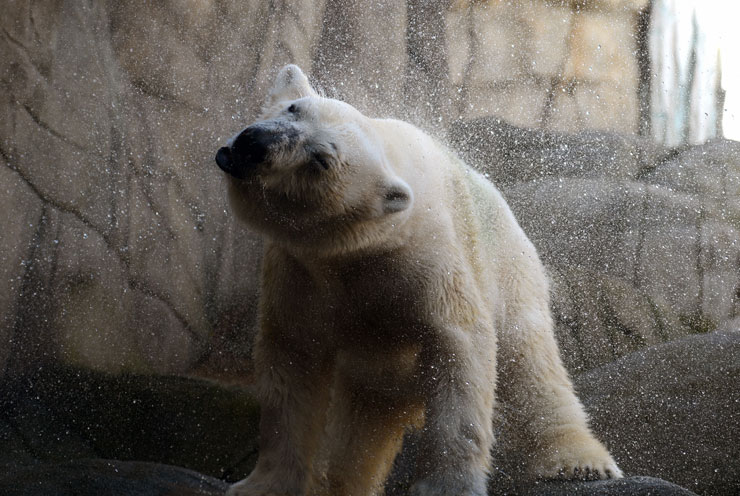Father mauled to death shielding daughters from polar bear
Aaron Gibbons, 31, ‘died a hero’ in surprise attack on remote Canadian island

A free daily email with the biggest news stories of the day – and the best features from TheWeek.com
You are now subscribed
Your newsletter sign-up was successful
A father has been mauled to death by a polar bear after placing himself between the animal and his children.
The tragedy occurred on Sentry Island, a popular hunting and fishing ground off the coast of Canada’s remote northern Nunavut territory, a vast Arctic expanse populated mostly by a handful of indigenous Inuit communities.
Aaron Gibbons, from the nearby coastal hamlet of Arviat, was gathering bird eggs on the island with his school-age daughters when a bear appeared and headed towards them, Nunatsiaq News reports.
The Week
Escape your echo chamber. Get the facts behind the news, plus analysis from multiple perspectives.

Sign up for The Week's Free Newsletters
From our morning news briefing to a weekly Good News Newsletter, get the best of The Week delivered directly to your inbox.
From our morning news briefing to a weekly Good News Newsletter, get the best of The Week delivered directly to your inbox.
The 31-year-old urged the children to retreat to their boat, moored nearby, while he stood his ground between the animal and the girls.
Gibbons’ uncle, Gordy Kidlapik, said that his “qangiaq” (nephew) died a hero:
Although Gibbons owned a rifle and was said to be a good hunter, the Royal Canadian Mountain Police said that it appeared that he could not get to the weapon in time.
The bear attacked, mauling him as his young daughters frantically called relatives on the boat’s CB radio.
A free daily email with the biggest news stories of the day – and the best features from TheWeek.com
“We actually heard the call for help,” Kidlapik said. “It was terrible to listen to.”
An individual from another party nearby on the island shot and killed the bear, but Gibbons could not be saved. He is the first person to die from a polar bear mauling in the territory since 1999.
The tragedy has drawn considerable comment in the region not only because of Gibbons’ act of self-sacrifice, but also because of the incident’s wider implications for the growing problem of polar bears losing their natural fear of humans as a result of the tourist excursion industry.
The creatures’ in-built wariness of human settlements has long enabled bear and human populations to co-exist in relative harmony.
However, the proliferation of tours offering visitors a chance to get up close and personal with polar bears means that the animals have become used to the presence of humans, locals say.
Kidlapik told the Toronto Star that such excursions were a “concern” for Arviat residents.
“We’re noticing more bears who have lost their fear approaching humans,” he said. “It wasn’t like that before.”
The statistics appear to confirm this trend. In November 2017, the Kivalliq region’s Wildlife Board warned that “polar bear encounters with humans have increased significantly, especially near Arviat, Chesterfield Inlet and Whale Cove”.
-
 Quiz of The Week: 14 – 20 February
Quiz of The Week: 14 – 20 FebruaryQuiz Have you been paying attention to The Week’s news?
-
 The Week Unwrapped: Do the Freemasons have too much sway in the police force?
The Week Unwrapped: Do the Freemasons have too much sway in the police force?Podcast Plus, what does the growing popularity of prediction markets mean for the future? And why are UK film and TV workers struggling?
-
 Properties of the week: pretty thatched cottages
Properties of the week: pretty thatched cottagesThe Week Recommends Featuring homes in West Sussex, Dorset and Suffolk
-
 Epstein files topple law CEO, roil UK government
Epstein files topple law CEO, roil UK governmentSpeed Read Peter Mandelson, Britain’s former ambassador to the US, is caught up in the scandal
-
 Iran and US prepare to meet after skirmishes
Iran and US prepare to meet after skirmishesSpeed Read The incident comes amid heightened tensions in the Middle East
-
 Israel retrieves final hostage’s body from Gaza
Israel retrieves final hostage’s body from GazaSpeed Read The 24-year-old police officer was killed during the initial Hamas attack
-
 China’s Xi targets top general in growing purge
China’s Xi targets top general in growing purgeSpeed Read Zhang Youxia is being investigated over ‘grave violations’ of the law
-
 Panama and Canada are negotiating over a crucial copper mine
Panama and Canada are negotiating over a crucial copper mineIn the Spotlight Panama is set to make a final decision on the mine this summer
-
 Why Greenland’s natural resources are nearly impossible to mine
Why Greenland’s natural resources are nearly impossible to mineThe Explainer The country’s natural landscape makes the task extremely difficult
-
 Iran cuts internet as protests escalate
Iran cuts internet as protests escalateSpeed Reada Government buildings across the country have been set on fire
-
 US nabs ‘shadow’ tanker claimed by Russia
US nabs ‘shadow’ tanker claimed by RussiaSpeed Read The ship was one of two vessels seized by the US military